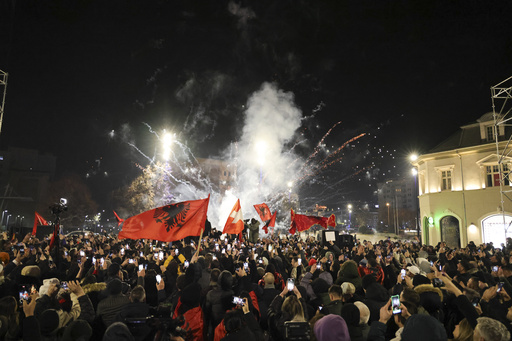PRISTINA, Kosovo — Observers from the European Union on Tuesday praised the parliamentary elections in Kosovo for being “peaceful and competitive,” but also expressed concerns regarding the left-wing government that achieved the highest number of seats for its role in polarizing political discourse.
The EU’s 104-member Election Observation Mission, along with the Council of Europe and various international and local entities, oversaw the voting process that took place on February 9. The Self-Determination Movement Party, or Vetevendosje!, led by Prime Minister Albin Kurti, garnered the most seats but fell short of securing a parliamentary majority, according to the Central Election Commission. This outcome compels the party to seek a coalition partner to establish the forthcoming government.
The EU observers noted, “The elections were peaceful and competitive with participation from all communities, testing a new legal framework.” They acknowledged the lively campaign that took place despite the harsh rhetoric stemming from significant political rifts.
This election was historic as it marked the first completion of a full four-year parliamentary mandate since Kosovo declared independence in 2008. It was also the ninth parliamentary election since the conclusion of the 1998-1999 war, which led to the expulsion of Serbian forces after a 78-day NATO airstrikes campaign.
Kosovo’s independence is not recognized by Serbia, adding to the complexities faced by the newly elected officials. The recent election is crucial in shaping Kosovo’s leadership as negotiations regarding normalizing relations with Serbia are currently at a standstill, while assistance from abroad remains uncertain for one of Europe’s least affluent nations.
Within the 120-seat parliament, 20 seats are set aside for minority groups, with ten designated specifically for the ethnic Serb community. The primary party representing this minority group, Srpska Lista, has the backing of Serbian President Aleksandar Vucic, who encouraged voters to support the party; it appears to have achieved around ten seats in the elections.
The EU observers pointed out that members of the party exerted “pressure on voters,” many of whom rely on social benefits from Serbia or employment within Serbian-managed institutions located in Kosovo’s Serb-dominated areas. Ahead of the elections, Belgrade also declared that 5,000 Serbs in Kosovo would start receiving financial support of 170 euros per month starting mid-February.
Moreover, observers criticized Vetevendosje! for its efforts to impede the certification of Srpska Lista, alongside an escalated tone aimed at delegitimizing the party’s involvement in the electoral process.
As Kurti embarks on his new term, he is likely to focus on rebuilding relationships with Western nations after a series of actions by his administration heightened tensions with both Serbia and the ethnic Serb population in Kosovo. Notable measures include a ban on Serbian currency, the dinar, and restrictions on monetary transfers to Kosovo’s Serb community.
Facing a myriad of challenges, Kurti must navigate the aftermath of Washington’s suspension of foreign aid and the European Union’s withdrawal of funding for specific initiatives nearly two years ago. Additionally, he is under increasing pressure to enhance public sector wages and pensions, as well as to improve educational and healthcare systems, and address widespread poverty.
With its population totaling 1.6 million, Kosovo ranks among the poorest regions in Europe, struggling with an annual gross domestic product of less than 6,000 euros ($6,200) per capita. The EU observers also criticized Richard Grenell, the U.S. envoy for special missions, for his interference in the election campaign, addressing concerns about Kurti’s reliability as a partner for the United States.



